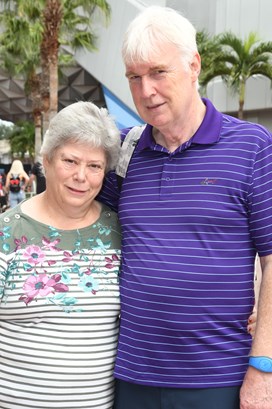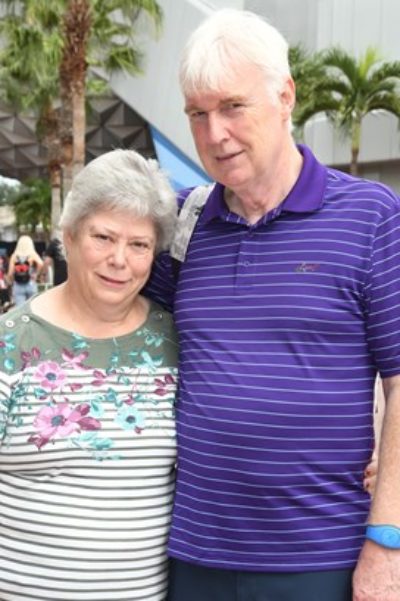



Penny’s story
"I'm passionate about sharing my story now that I’ve reached the ‘golden one per cent'"
Penny was told that she had pancreatic cancer in 2008 and only had six weeks left to live. She defied the odds and in 2019 joined the ‘golden one per cent’ of people who can celebrate surviving ten years beyond their diagnosis.
“I started feeling ill in 2007. I was getting serious chest infections and although I took antibiotics the infections never cleared up. By June 2008, a month before my daughter’s wedding, I had an emergency appointment with my doctor because I really couldn’t breathe. The doctor told me that I had ‘summer asthma’ and chest infections. He gave me an inhaler and told me to ‘get on with it’. I was able to get through my daughter’s wedding with the help of three high-steroid inhalers which I was taking up to 40 times a day.
When my daughter came back from her honeymoon three weeks later, my health was falling off a cliff. My GP referred me to the hospital which is only 12 miles away but it took me an hour-and-a-half to drive there because I had to keep stopping, I couldn’t breathe. When I got to the hospital, I collapsed and was rushed into A&E. They did lots of tests and they said I had a chronic chest infection but I was discharged two hours later because there were no beds. The next morning, I felt like my shoulder had been dislocated. I couldn’t breathe, I couldn’t eat and my husband said that I looked like I was dying.
I was taken into hospital in an ambulance and was told I would get CT scans, x-rays and everything but it wasn’t until the sixth day in hospital that I got an ultrasound. To put you in the picture, I was sitting in an armchair for eight days, unable to lie down because I felt like I was drowning. After the ultrasound I was rushed in for a CT scan and when the results came back my consultant told me that I had cancer and somebody would come and talk to me about it. A surgeon came and told me I had kidney cancer – although it later turned out that it wasn’t kidney cancer, and they were going to do a Nephrectomy, which is surgery to remove a kidney. I walked out of that meeting and straight into an ambulance to another hospital. During the eight hour operation, I lost my left kidney, my spleen and the tail of my pancreas. They also drained over a litre and a half of fluid out of my chest.
I was kept on the ward for a really long time. It got to a point where my daughter said that if I don’t go home now I would never leave hospital and would die there. I needed to go home to get a fresh outlook on life. So I was taken home and came back to later in the week to see the oncologist. I lost five stone in that time.
Friday 31st October was the day I got my diagnosis and it was the worst day of my life. I saw the oncologist and she said: “You’ve got advanced pancreatic cancer, it’s in your liver. We’ll give you six weeks maximum to live so go home and get your life in order.” She then offered me a drugs trial but said it could only give me an extra two weeks. I was then transferred to another hospital. The first thing the oncologist did was get liver biopsies done, although I don’t know why that didn’t already happen. Ten days later she said I had massive lesions in my liver but none of them were cancerous which made a huge difference. I started chemotherapy in November and continued for about eight months, until July 2009. I had CT scans every three months and I saw my oncologist every three months. Finally I got to the stage where they said that I would only have to see the oncologist every six months.
I fell apart at New Year because I just kept saying to myself “You shouldn’t be here, you shouldn’t be still alive.” Having such an awful prognosis it put all these negative thoughts into my head and I become quite negative about surviving. As time went on I got survivors guilt because everybody else I know who has been diagnosed with pancreatic cancer is dead. I lived with that for a long time until I saw someone who specialised in PTSD in soldiers. He told me to put it to the back of my mind and keep the positive stuff to the front which really helped.
So I carried on seeing my oncologist every six months until I went to my GP in 2011 with a lump, the size of a petit-pois, in my chest. Without examining me, my doctor said it was “just a pulled muscle, love” and that I should be careful carrying my granddaughter. I was getting more chest infections and I knew there was something wrong, even if my GP said it was nothing. So I phoned my pancreatic oncologist and she got me a CT scan for the next day and a biopsy shortly after. The biopsy came back inconclusive so we went ahead with a lumpectomy and removed the lump which had grown to the size of a walnut in two weeks.
It was actually my pancreatic oncologist that told me I had breast cancer. She was broken hearted because she’d got me so far from my pancreatic cancer diagnosis. She told me the news, gave me a big hug and then in 30 seconds I had a breast cancer nurse in the room with me. She took me off and did so many tests. Ten days after that I had a partial mastectomy and I lost everything from the nipple and below. Then I had six sets of very heavy chemotherapy and then I did a month of radiotherapy. My breast cancer was one of the worst, most aggressive kinds you can have. They said they were lucky to get it out when they did.
My experience of being diagnosed with breast cancer was very different. With breast cancer they wrap you up in a big pink fluffy blanket and take care of you like royalty. With pancreatic cancer, it’s like a kick in the teeth. There was such a difference between how the news was delivered and how you’re treated. One tells you to go home and die and the other says: “We can do this” and give you hope.
When I had pancreatic cancer the only place I got support and help was the Maggie’s Centre in Edinburgh. The whole team were amazing. They helped me with everything, from diet to emotional support. So when I found out that I had breast cancer I went straight into Maggie’s because it was just across the road. When I walked in and told them I had breast cancer they said “Oh that will be a doddle because you’d beaten one, this is going to be easy”. That was seven years ago and I’m still here.
The biggest change I would love to see for the future is in how patients are told how long they have. Any cancer diagnosis should be delivered with respect and empathy – unfortunately it’s often not the case. So many people hear the word cancer and just give up, even when their diagnosis isn’t terminal. I always said I don’t know why I survived but I’m obviously here for a reason. And if that reason is to tell my story after ten years to give people hope I’m happy. At the end of the day people need some form of hope.
Ten years after my pancreatic cancer diagnosis I’m still here, which I’m very thankful for. Less than seven per cent of people with pancreatic cancer survive beyond five years and even less get to ten years. I’m very passionate about sharing my story now that I’ve reached this ‘golden one per cent’. There aren’t that many of us so I need to speak out.
I have had a fantastic ten years and this year is one of celebration. It’s my way of saying thank you to my family and close friends. I feel like I’ve had the most amazing year, that they told me I would never see. I’m just trying to take every day as a fresh start and I’m living my life to the full.


